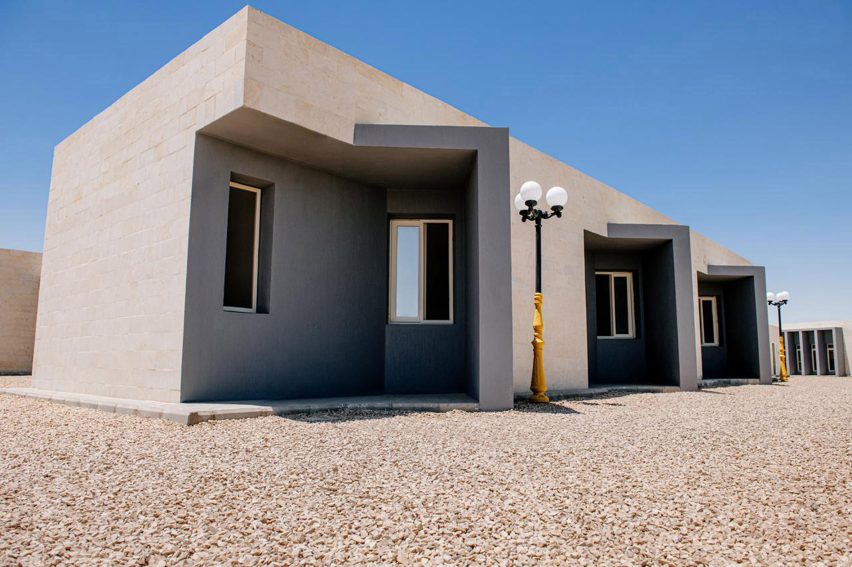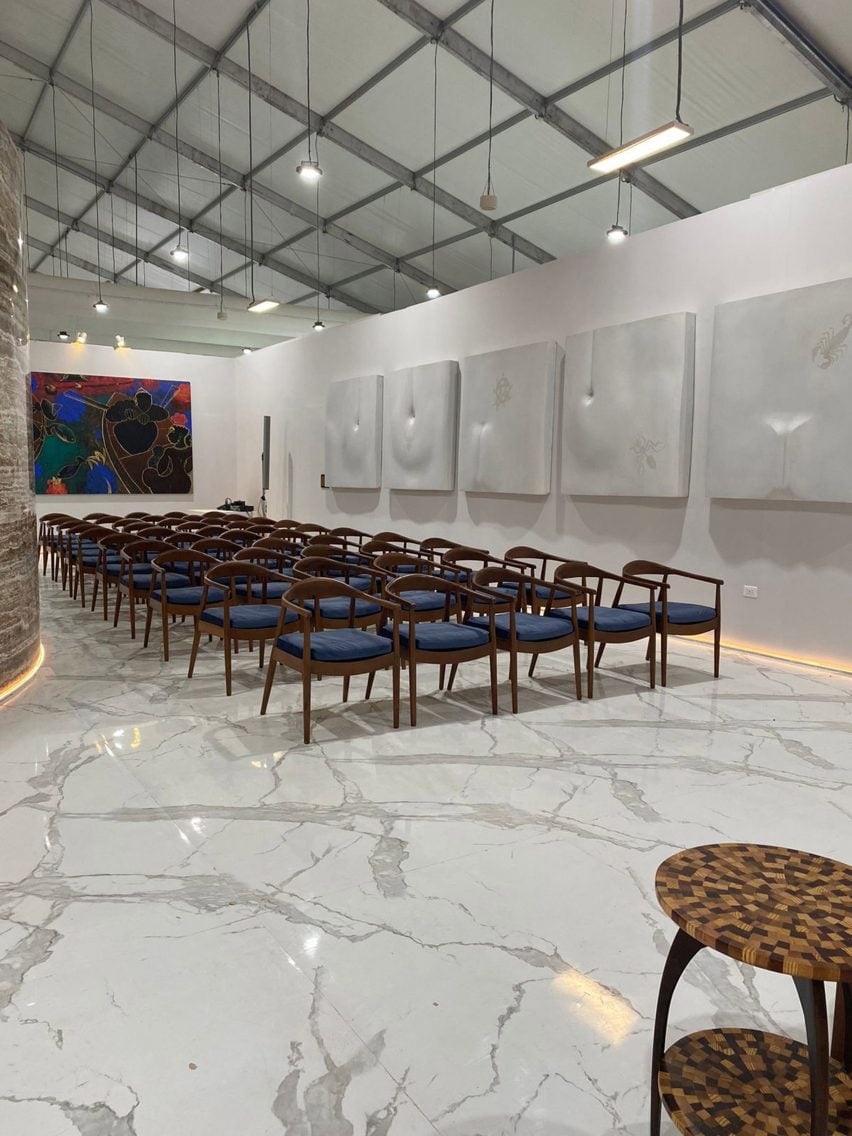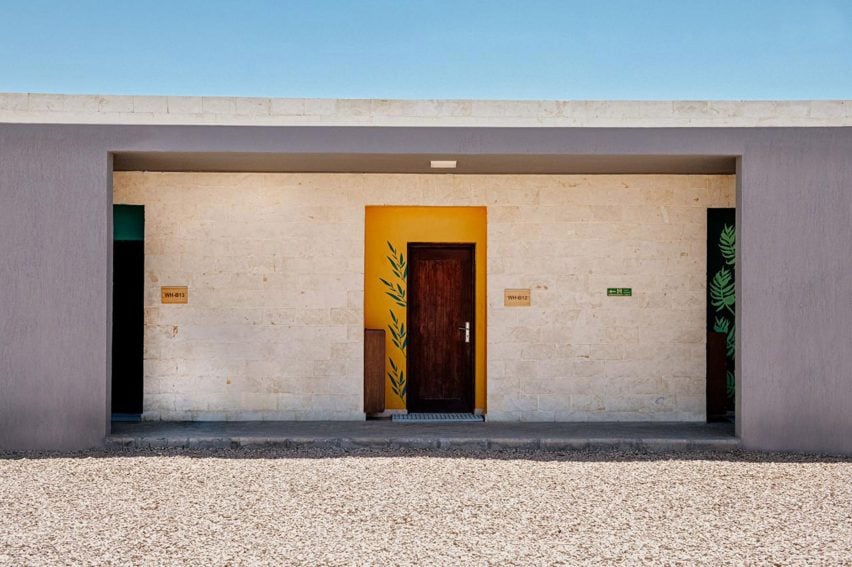
Sustainable architecture efforts hindered by "sloppiness" says UN climate ambassador
Architects must take greater accountability for their sector to help decarbonise the built environment, says UN Race to Zero ambassador Sarah El Battouty in this exclusive interview from the final day of the COP27 climate conference.
"For years and years, we've had everyone create a silly building design and then stick a couple of solar panels on top and call it a green building," the Egyptian architect told Dezeen. "This kind of sloppiness was allowed all the time."
Climate action across the building environment is still "severely lagging", according to two separate reports launched at COP27 last week, leaving the industry "well off track" from meeting its decarbonisation targets.
"The entire sector and all its players, including the architects, are lagging," said El Battouty. "We're not accountable. Nobody says: this isn't an energy-efficient building. Nobody says: why has it been designed poorly?"
UN climate ambassadors want more architects
El Battouty spoke to Dezeen from COP27 in Sharm el-Sheikh, Egypt, where she was responsible for designing the country's national pavilion, as well as acting as an ambassador for the United Nations campaigns to push decarbonisation and climate resilience.
This role is particularly significant, she argues, as the buildings sector has historically been sidelined in the climate change fight despite being responsible for more than 40 per cent of global emissions.
"It's fantastic to have the Race to Zero and Race to Resilience choose an architect on board their global ambassadors' team," she said.
"It's a very strong message. And I believe that this is a real game-changer because we want to have more people in this sector as decision-makers and leaders."

Last year's COP26 marked the greatest involvement from the built environment sector in any UN climate change summit to date, with an entire day and more than 120 events dedicated to the topic.
However, the sector's level of decarbonisation actually decreased last year, according to the Global Status Report for Buildings and Construction, as efforts to improve buildings' energy efficiency were outpaced by increases in their floor area and energy demand.
"Not enough is being done because the sector is being addressed so late in the game," El Battouty said.
COP27 calls for affordable green housing in Global South
Although she concedes that much of the necessary climate action will have to come in the form of regulation and financial incentives, El Battouty says that architects should lead by example to show governments that decarbonisation is doable.
This could involve securing private investment to develop low-carbon material innovations and construction techniques, as well as focusing on local, low-cost solutions – especially in the Global South where climate change is already wreaking havoc.
"Let's take this opportunity," El Battouty said. "Africa is young, the Middle East is young, they've got a lot of population and they all need housing."
"Cities are not working very well anymore anywhere around the world when it comes to climate change. And therefore, you've got the case for financing."

Helping countries in the Global South to build climate resilience is a key topic at COP27, which is the first Conference of the Parties to take place outside of Europe since 2016's COP22 in Marrakech.
As a result, events at the conference are focusing on issues from Africa's housing challenge to improving the lives of climate-vulnerable people in informal settlements.
"The new thing is that we're talking about affordable green housing in Egypt, in India, in makeshift areas, in areas with displacement," El Battouty said.
"We are now having sessions on rural communities and building for resilience. These kinds of themes are different because COP is in the Global South and because we've recently seen so much loss and damage to people's homes, and to entire cities."
Sustainable architecture shouldn't be "haute couture"
Climate resilience is a key tenet of El Battouty's own work, as seen in the solar-powered Bahareya Village, which her environmental design company ECOnsult completed in Egypt's western desert in 2020.
Billed as the "first carbon-neutral project in the MENA region", the complex integrates indigenous techniques for passive cooling to reduce indoor temperatures by up to 10 degrees Celsius without the need for air conditioning, lowering operational emissions while making the buildings resilient to rising temperatures.
El Battouty, who is also a senior climate advisor to the Egyptian president, is now working to apply this same logic to 4,500 existing Egyptian villages as part of the country's Decent Life initiative.
"We don't want green architecture to be haute couture," she said. "Everybody's suffering from climate change, so why should the solution only be given to a particular strata?"
"What we need is to make sure that every brief for a building and every brief for a product questions whether it will be serving human comfort today and in five years and in 10 years."
"Developed countries have a responsibility towards support"
El Battouty hopes that enough pioneering projects like this are on show at COP27 – in the Buildings Pavilion and beyond – to mobilise the amount of investment needed to adopt them at scale.
"Developed countries have a responsibility towards support and we are confident that enough projects are being shown to gain that kind of support without delay," she said.

"We have enough brilliant architects all over the world that have taken it upon themselves to do these kinds of projects, and execute them successfully when they weren't mandated to do so," she added.
"So imagine what will happen when we have the backing of government and the backing of financing."
Despite COP27 being billed as an "African COP", critics have pointed out that the event has also seen a marked rise in attendance from fossil fuel lobbyists, who this year outnumbered the delegations of all of the 10 most climate-vulnerable countries put together.
In the lead-up to the climate summit, Egypt also faced criticism over its human rights violations and "highly insufficient" climate targets, which do not include aiming for net-zero and in fact put the country's emissions on track to increase by around 50 per cent by 2030.
All photography is courtesy of ECOnsult.
COP27 is taking place in Sharm El-Sheikh, Egypt, from 6 to 18 November. See Dezeen Events Guide for an up-to-date list of architecture and design events taking place around the world.